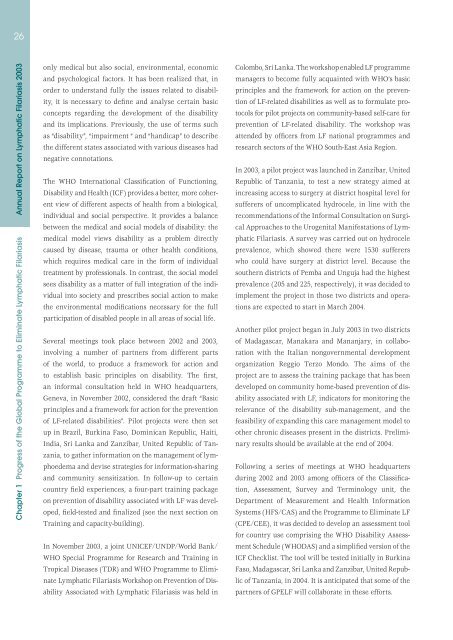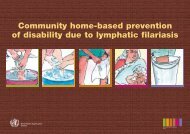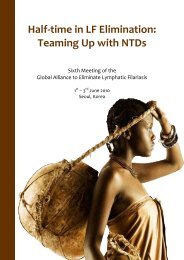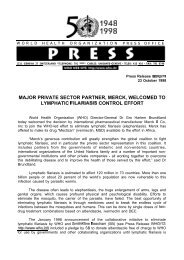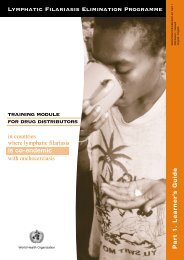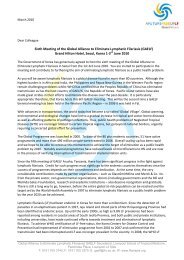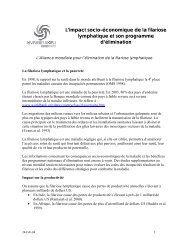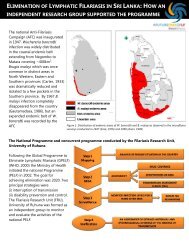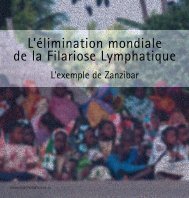Global Programme to Eliminate Lymphatic Filariasis ... - libdoc.who.int
Global Programme to Eliminate Lymphatic Filariasis ... - libdoc.who.int
Global Programme to Eliminate Lymphatic Filariasis ... - libdoc.who.int
You also want an ePaper? Increase the reach of your titles
YUMPU automatically turns print PDFs into web optimized ePapers that Google loves.
26Annual Report on <strong>Lymphatic</strong> <strong>Filariasis</strong> 2003Chapter 1 Progress of the <strong>Global</strong> <strong>Programme</strong> <strong>to</strong> <strong>Eliminate</strong> <strong>Lymphatic</strong> <strong>Filariasis</strong>only medical but also social, environmental, economicand psychological fac<strong>to</strong>rs. It has been realized that, inorder <strong>to</strong> understand fully the issues related <strong>to</strong> disability,it is necessary <strong>to</strong> define and analyse certain basicconcepts regarding the development of the disabilityand its implications. Previously, the use of terms suchas “disability”, “impairment “ and “handicap” <strong>to</strong> describethe different states associated with various diseases hadnegative connotations.The WHO International Classification of Functioning,Disability and Health (ICF) provides a better, more coherentview of different aspects of health from a biological,individual and social perspective. It provides a balancebetween the medical and social models of disability: themedical model views disability as a problem directlycaused by disease, trauma or other health conditions,which requires medical care in the form of individualtreatment by professionals. In contrast, the social modelsees disability as a matter of full <strong>int</strong>egration of the individualin<strong>to</strong> society and prescribes social action <strong>to</strong> makethe environmental modifications necessary for the fullparticipation of disabled people in all areas of social life.Several meetings <strong>to</strong>ok place between 2002 and 2003,involving a number of partners from different partsof the world, <strong>to</strong> produce a framework for action and<strong>to</strong> establish basic principles on disability. The first,an informal consultation held in WHO headquarters,Geneva, in November 2002, considered the draft “Basicprinciples and a framework for action for the preventionof LF-related disabilities”. Pilot projects were then setup in Brazil, Burkina Faso, Dominican Republic, Haiti,India, Sri Lanka and Zanzibar, United Republic of Tanzania,<strong>to</strong> gather information on the management of lymphoedemaand devise strategies for information-sharingand community sensitization. In follow-up <strong>to</strong> certaincountry field experiences, a four-part training packageon prevention of disability associated with LF was developed,field-tested and finalized (see the next section onTraining and capacity-building).In November 2003, a jo<strong>int</strong> UNICEF/UNDP/World Bank/WHO Special <strong>Programme</strong> for Research and Training inTropical Diseases (TDR) and WHO <strong>Programme</strong> <strong>to</strong> <strong>Eliminate</strong><strong>Lymphatic</strong> <strong>Filariasis</strong> Workshop on Prevention of DisabilityAssociated with <strong>Lymphatic</strong> <strong>Filariasis</strong> was held inColombo, Sri Lanka. The workshop enabled LF programmemanagers <strong>to</strong> become fully acqua<strong>int</strong>ed with WHO’s basicprinciples and the framework for action on the preventionof LF-related disabilities as well as <strong>to</strong> formulate pro<strong>to</strong>colsfor pilot projects on community-based self-care forprevention of LF-related disability. The workshop wasattended by officers from LF national programmes andresearch sec<strong>to</strong>rs of the WHO South-East Asia Region.In 2003, a pilot project was launched in Zanzibar, UnitedRepublic of Tanzania, <strong>to</strong> test a new strategy aimed atincreasing access <strong>to</strong> surgery at district hospital level forsufferers of uncomplicated hydrocele, in line with therecommendations of the Informal Consultation on SurgicalApproaches <strong>to</strong> the Urogenital Manifestations of <strong>Lymphatic</strong><strong>Filariasis</strong>. A survey was carried out on hydroceleprevalence, which showed there were 1530 sufferers<strong>who</strong> could have surgery at district level. Because thesouthern districts of Pemba and Unguja had the highestprevalence (205 and 225, respectively), it was decided <strong>to</strong>implement the project in those two districts and operationsare expected <strong>to</strong> start in March 2004.Another pilot project began in July 2003 in two districtsof Madagascar, Manakara and Mananjary, in collaborationwith the Italian nongovernmental developmen<strong>to</strong>rganization Reggio Terzo Mondo. The aims of theproject are <strong>to</strong> assess the training package that has beendeveloped on community home-based prevention of disabilityassociated with LF, indica<strong>to</strong>rs for moni<strong>to</strong>ring therelevance of the disability sub-management, and thefeasibility of expanding this care management model <strong>to</strong>other chronic diseases present in the districts. Preliminaryresults should be available at the end of 2004.Following a series of meetings at WHO headquartersduring 2002 and 2003 among officers of the Classification,Assessment, Survey and Terminology unit, theDepartment of Measurement and Health InformationSystems (HFS/CAS) and the <strong>Programme</strong> <strong>to</strong> <strong>Eliminate</strong> LF(CPE/CEE), it was decided <strong>to</strong> develop an assessment <strong>to</strong>olfor country use comprising the WHO Disability AssessmentSchedule (WHODAS) and a simplified version of theICF Checklist. The <strong>to</strong>ol will be tested initially in BurkinaFaso, Madagascar, Sri Lanka and Zanzibar, United Republicof Tanzania, in 2004. It is anticipated that some of thepartners of GPELF will collaborate in these efforts.


